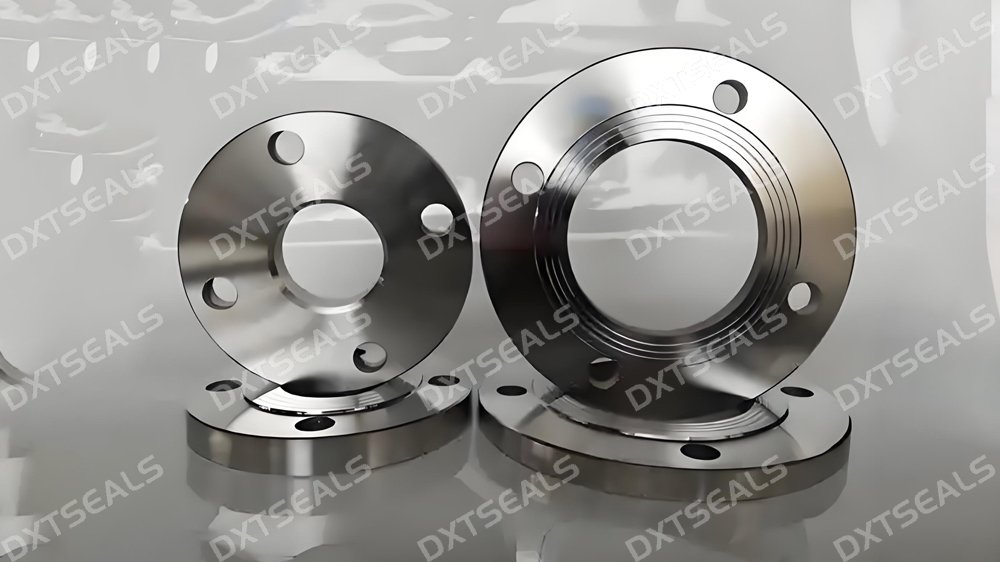
Corrosion is one of the most common challenges in industrial applications, especially in sealing systems exposed to moisture, chemicals, or aggressive media. When metal support components such as flanges, housings, or backup rings corrode, they not only lose strength but also compromise the performance and lifespan of seals.
In this article, DXTSEALS compares the corrosion resistance of commonly used metals and provides practical recommendations for protecting sealing components.
1. Why Corrosion Resistance Matters in Sealing Systems
-
Prevents Seal Damage: Corroded metal surfaces can scratch, deform, or weaken seals.
-
Maintains Reliability: Stronger resistance ensures stable sealing under harsh conditions.
-
Extends Service Life: Reduces premature failure due to rust or chemical attack.
-
Supports Industry Demands: Critical in marine, chemical, energy, and food industries.
2. Corrosion Resistance of Common Metals
| Metal | Corrosion Resistance | Typical Application in Sealing Systems |
|---|---|---|
| Stainless Steel | Excellent (resists rust, chemicals, acids, seawater) | Flanges, pumps, food & pharma sealing systems |
| Carbon Steel | Poor (prone to rust in moist/chemical environments) | High-pressure housings, requires coating |
| Alloy Steel | Moderate to good (depends on alloying elements like Cr, Ni, Mo) | Hydraulic systems, heavy-duty sealing |
| Aluminum | Good (forms natural oxide layer, lightweight) | Lightweight sealing housings, aerospace |
| Copper | Good (resists fresh water, limited in strong acids/alkalis) | Heat transfer sealing systems, marine |
| Bronze/Brass | Good (better than copper; resists seawater corrosion) | Marine seals, valve housings |
3. Sealing Protection Recommendations
To ensure reliable sealing performance in corrosive environments, DXTSEALS suggests the following strategies:
a. Choose the Right Metal Material
-
Use stainless steel (304/316) for chemical, marine, or food industries.
-
Select bronze or brass for seawater and marine sealing systems.
-
Opt for alloy steels with chromium or nickel for balanced strength and corrosion resistance.
b. Apply Surface Treatments
-
Electroplating (zinc, nickel, chrome): Improves corrosion protection.
-
Anodizing (for aluminum): Enhances oxide layer stability.
-
Coatings (PTFE, epoxy): Reduces metal-to-media contact.
c. Use Corrosion-Resistant Sealing Materials
-
Pair metals with FKM, EPDM, or PTFE seals for chemical resistance.
-
Avoid NBR in strong acid/alkali environments.
d. Regular Maintenance & Inspection
-
Clean metal surfaces and seals to prevent buildup of corrosive media.
-
Replace corroded support components promptly to protect sealing integrity.
4. Conclusion
The corrosion resistance of metals directly impacts sealing reliability and lifespan.
-
Stainless steel and bronze are excellent for corrosive environments.
-
Aluminum offers lightweight benefits with decent resistance.
-
Carbon steel requires protective coatings to avoid rapid degradation.
At DXTSEALS, we specialize in providing corrosion-resistant sealing solutions, including advanced metal housings and seals made from FKM, EPDM, and PTFE. By choosing the right metal and applying proper protection measures, you can ensure long-term sealing reliability in harsh industrial environments.
📩 Contact DXTSEALS today for expert guidance on metal selection and corrosion protection for sealing systems.
